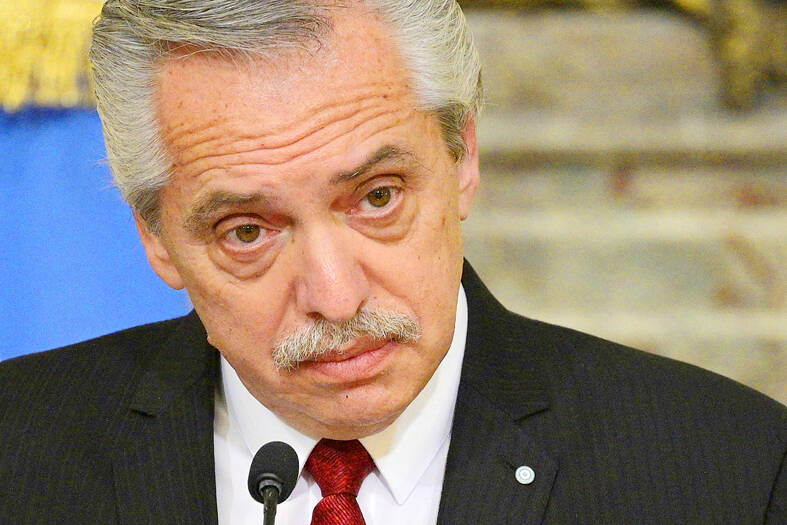An Argentine judge on Thursday ordered ex-Argentine president Alberto Fernandez, 66, to stand trial for alleged corruption relating to insurance policies taken out by government departments during his 2019-to-2023 term.
Fernandez would be prosecuted for “negotiations incompatible with the exercise of public office,” according to Judge Sebastian Casanello’s decision, published in Argentine media and confirmed by defense lawyer Mariana Barbitta.
Barbitta called it “an arbitrary, unfounded decision” that her team would appeal.

Photo: AFP
Fernandez stands accused of fraudulent administration over his government’s use of brokers — one of whom allegedly had ties to his office — to contract insurance policies that could have been negotiated directly.
The main broker was allegedly the husband of Fernandez’s personal secretary.
The former president was aware of the arrangement, the judge’s brief said.
Fernandez has denied any wrongdoing.
The judge found the former president had “created and enabled a permissive environment” that allowed his close circle to profit, Argentine daily newspaper The Nation reported the ruling as saying.
The former secretary, her husband and about 30 others would also face trial in the case.
Fernandez did not seek re-election after serving a single term.
The corruption allegations emerged when a court ordered an examination of his secretary’s phone while investigating assault claims made against Fernandez by his former partner Fabiola Yanez.
Yanez filed a complaint accusing Fernandez of having beaten her during their relationship, which ended after he left office.
He faces a separate trial on charges of domestic abuse.
The graft case involves policies taken out with Nacion Seguros, the insurance arm of state-owned Banco Nacion, which Fernandez chose to cover government departments against various types of risks.
Casanello ordered a freeze on about US$11 million of Fernandez’s assets, Thursday’s ruling showed.
Fernandez’s leftist Peronist movement, which dominated Argentine politics for most of the country’s post-war history, has been dogged by allegations of corruption.

VAGUE: The criteria of the amnesty remain unclear, but it would cover political violence from 1999 to today, and those convicted of murder or drug trafficking would not qualify Venezuelan Acting President Delcy Rodriguez on Friday announced an amnesty bill that could lead to the release of hundreds of prisoners, including opposition leaders, journalists and human rights activists detained for political reasons. The measure had long been sought by the US-backed opposition. It is the latest concession Rodriguez has made since taking the reins of the country on Jan. 3 after the brazen seizure of then-Venezuelan president Nicolas Maduro. Rodriguez told a gathering of justices, magistrates, ministers, military brass and other government leaders that the ruling party-controlled Venezuelan National Assembly would take up the bill with urgency. Rodriguez also announced the shutdown

Civil society leaders and members of a left-wing coalition yesterday filed impeachment complaints against Philippine Vice President Sara Duterte, restarting a process sidelined by the Supreme Court last year. Both cases accuse Duterte of misusing public funds during her term as education secretary, while one revives allegations that she threatened to assassinate former ally Philippine President Ferdinand Marcos Jr. The filings come on the same day that a committee in the House of Representatives was to begin hearings into impeachment complaints against Marcos, accused of corruption tied to a spiraling scandal over bogus flood control projects. Under the constitution, an impeachment by the

Exiled Tibetans began a unique global election yesterday for a government representing a homeland many have never seen, as part of a democratic exercise voters say carries great weight. From red-robed Buddhist monks in the snowy Himalayas, to political exiles in megacities across South Asia, to refugees in Australia, Europe and North America, voting takes place in 27 countries — but not China. “Elections ... show that the struggle for Tibet’s freedom and independence continues from generation to generation,” said candidate Gyaltsen Chokye, 33, who is based in the Indian hill-town of Dharamsala, headquarters of the government-in-exile, the Central Tibetan Administration (CTA). It

China executed 11 people linked to Myanmar criminal gangs, including “key members” of telecom scam operations, state media reported yesterday, as Beijing toughens its response to the sprawling, transnational industry. Fraud compounds where scammers lure Internet users into fake romantic relationships and cryptocurrency investments have flourished across Southeast Asia, including in Myanmar. Initially largely targeting Chinese speakers, the criminal groups behind the compounds have expanded operations into multiple languages to steal from victims around the world. Those conducting the scams are sometimes willing con artists, and other times trafficked foreign nationals forced to work. In the past few years, Beijing has stepped up cooperation